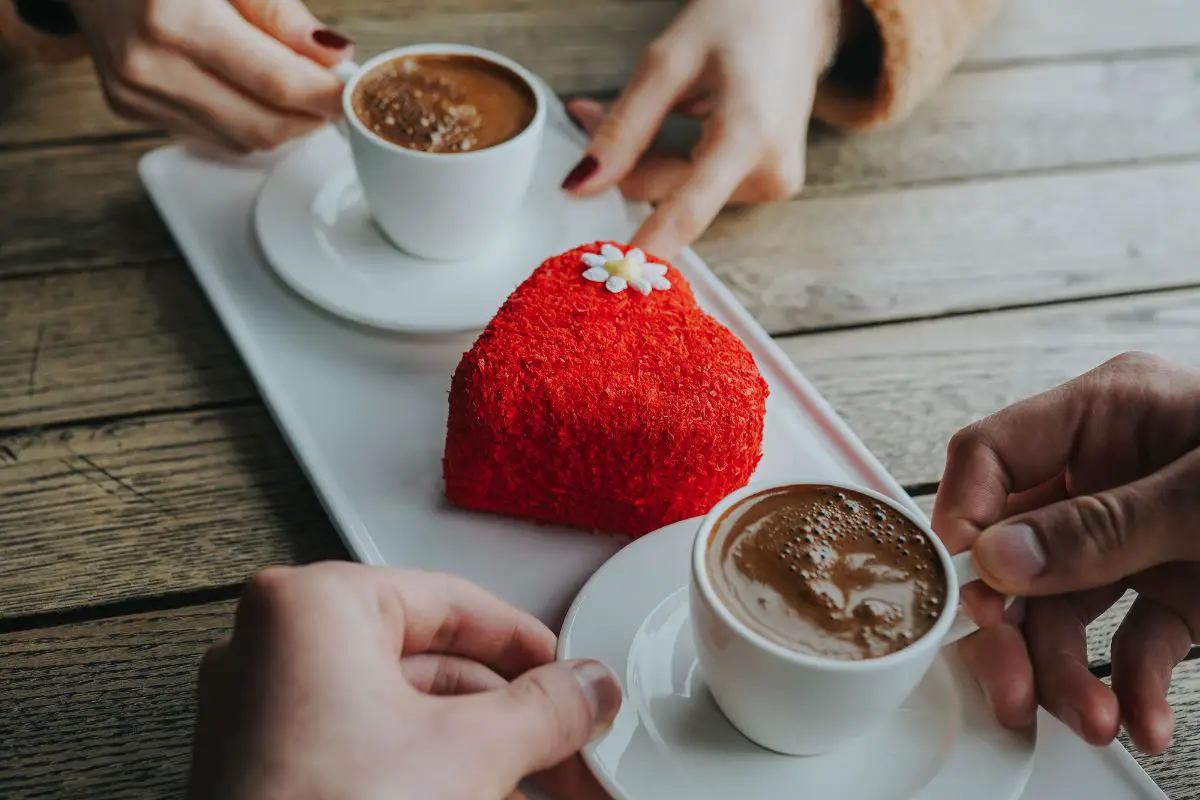In the realm of dating and relationships, the coffee date has become a symbolic ritual, often serving as a precursor to more significant encounters. While seemingly innocuous, this casual meeting over a cup of coffee can carry a multitude of meanings and intentions. The question arises: does a coffee date hold any significance or is it merely a social convention?

This article aims to explore the purpose and potential implications of a coffee date, shedding light on the subtle signs to look for, the ambiguity that accompanies such encounters, and the role of timing and context in determining the nature of the connection formed.
The symbolism behind a coffee date lies in its simplicity and universality. Coffee, a beverage that transcends cultures and borders, represents a sense of comfort and familiarity. Likewise, the act of meeting for coffee suggests a desire for a relaxed and informal setting, where individuals can engage in conversation and get to know each other better. However, beneath this seemingly casual encounter lies a hidden complexity that can leave individuals questioning the true intentions of their coffee companion.
By delving into the nuances of a coffee date and deciphering the underlying messages, one can navigate this social landscape with greater awareness and understanding.
Key Takeaways
- Coffee dates are a symbolic ritual in dating and relationships, often serving as a platform for getting to know each other.
- Observing signs such as engagement, active listening, eye contact, and leaning in can help determine the potential for a deeper connection during a coffee date.
- Engaging conversation and emotional connection during a coffee date can spark interest and indicate the potential for a romantic connection.
- Subsequent actions, such as expressing a desire to meet again, can demonstrate mutual interest and further solidify the significance of a coffee date.
Understanding the Purpose of a Coffee Date
The purpose of a coffee date is to engage in a casual and low-pressure social interaction in a public setting. Unlike a formal dinner or a movie date, a coffee date allows individuals to get to know each other in a relaxed environment without the added pressure of a romantic setting.
This type of date is often chosen for its simplicity and convenience, as meeting for a cup of coffee is a relatively quick and inexpensive way to spend time together. Additionally, the public nature of a coffee date provides a sense of safety and comfort, as it allows both parties to feel at ease knowing there are other people around.
During a coffee date, individuals have the opportunity to engage in meaningful conversation and establish a connection with their potential partner. This setting allows for open communication, as the relaxed environment encourages individuals to share their thoughts and interests without feeling overwhelmed or judged. Moreover, the absence of distractions, such as loud music or a crowded venue, allows for focused conversation and active listening. This can help both parties gauge their compatibility and determine if there is a potential for a deeper connection.
A coffee date serves as an introductory platform for individuals to interact in a casual and low-pressure manner. It provides a comfortable setting for conversation and allows both parties to get to know each other better. By engaging in meaningful conversation and establishing a connection, individuals can determine if there is potential for a deeper relationship.
In the subsequent section about ‘signs to look for during a coffee date,’ we will explore the subtle cues and behaviors that may indicate the level of interest and compatibility between the individuals involved.
Signs to Look for During a Coffee Date
Signs to observe during a coffee date can provide subtle indications about the potential significance of the encounter. While it is important not to jump to conclusions based solely on these signs, they can offer valuable insights into the other person’s level of interest and compatibility.
One sign to look for is the amount of engagement and active listening displayed by both parties. If both individuals are actively engaged in the conversation, asking questions, and showing genuine interest in each other’s lives, it could be an indication that the coffee date is meaningful and has the potential for a deeper connection.
Another sign to observe is the body language of the individuals involved. Non-verbal cues such as eye contact, leaning in, and mirroring each other’s movements can indicate a sense of comfort and attraction. If both parties are leaning in towards each other and maintaining eye contact, it suggests a certain level of connection and interest. On the other hand, if one person appears distant or disinterested, it could be a sign that the coffee date is not particularly significant to them.
Lastly, the level of future planning discussed during the coffee date can provide insights into the potential significance of the encounter. If both individuals engage in discussions about future activities or express a desire to meet again, it indicates a possibility for a deeper connection. On the contrary, if the conversation remains focused on the present and there is no mention of future plans, it might suggest that the coffee date is more casual or less meaningful.
Understanding these signs can help individuals navigate the ambiguity of a coffee date. By being observant and mindful of these subtle indications, individuals can make more informed decisions about the potential significance of the encounter and whether to pursue further interactions.
Navigating the Ambiguity of a Coffee Date

To effectively navigate the ambiguity of a coffee date, one must carefully observe subtle cues and indications that can shed light on the potential significance of the encounter. Here are three key factors to consider:
- Body Language: Pay close attention to the body language of your coffee date. Non-verbal cues can provide valuable insights into their level of interest and engagement. Notice if they maintain eye contact, lean in towards you during conversation, or exhibit open and relaxed postures. These are positive indicators that suggest they are enjoying the date and potentially interested in getting to know you better.
- Conversation Quality: The content and flow of conversation during a coffee date can also provide clues about the level of connection. Engaging and meaningful discussions often indicate a deeper interest and emotional connection. If you find that the conversation flows effortlessly, with both parties actively participating and showing genuine curiosity about each other, it could be a sign that the coffee date holds more significance than just a casual meeting.
- Follow-up Actions: After the coffee date concludes, observe the follow-up actions of your date. Do they initiate further communication or express a desire to meet again? Taking the initiative to plan future outings or sending thoughtful messages can indicate a potential romantic interest. It is important to note, however, that not everyone expresses their interest in the same way. Some individuals may be more reserved or hesitant, requiring additional time to process their feelings before taking any further steps.
By carefully considering these cues, one can gain a better understanding of the potential for a romantic connection. The observations made during a coffee date can provide valuable insights into the other person’s level of interest and compatibility. However, it is essential to remember that each individual is unique, and their actions may not always align with societal norms or expectations. Proceeding with patience and open communication can help navigate the uncertainty and foster a deeper connection.
The Potential for a Romantic Connection
One may uncover the latent embers of a potential romantic connection by astutely deciphering the intricate dance of non-verbal cues, engaging conversation, and subsequent actions that arise from a shared coffee encounter.
Non-verbal cues, such as eye contact, body language, and facial expressions, can provide subtle hints of attraction or interest. A lingering gaze, a slight touch on the arm, or a playful smile can indicate a desire for a deeper connection.
Additionally, engaging conversation that flows effortlessly and sparks mutual interest can create a sense of compatibility and emotional connection. The exchange of personal stories, shared laughter, and genuine curiosity about each other’s lives can foster a sense of intimacy and potential for romantic connection.
In addition to non-verbal cues and engaging conversation, subsequent actions following a coffee date can provide further insight into the potential for a romantic connection. If both individuals express a desire to meet again or make plans for future outings, it can be a clear indicator of mutual interest. Taking the initiative to stay in touch, such as texting or calling, can also signify a desire to continue building a connection. Furthermore, if both individuals make an effort to keep the conversation going after the initial coffee date, it suggests a willingness to invest time and energy into getting to know each other better.
The role of timing and context also plays a significant role in determining the potential for a romantic connection. A coffee date that takes place in a relaxed and comfortable environment, where both individuals feel at ease, can create a conducive atmosphere for building a connection. Additionally, the timing of the coffee date may influence the level of interest and commitment. If the date occurs early on in the getting-to-know-each-other phase, it may serve as a stepping stone towards a deeper romantic connection. However, if the coffee date takes place after several casual encounters, it may indicate a stronger interest in exploring a romantic relationship. Thus, the timing and context of a coffee date can provide valuable insights into the potential for a romantic connection.
Transitioning to the next section about the role of timing and context, it is crucial to understand how these factors can influence the trajectory of a potential romantic connection. By examining the interplay between timing, context, non-verbal cues, engaging conversation, and subsequent actions, one can gain a deeper understanding of the dynamics at play in a coffee date and its potential for blossoming into a romantic relationship.
The Role of Timing and Context
The timing and context in which a coffee encounter takes place can significantly influence the potential for a romantic connection to develop.
When two people meet for coffee, the circumstances surrounding the meeting can set the tone for the interaction. For example, if the coffee date takes place during the daytime in a casual setting, such as a local coffee shop, it may suggest a more relaxed and informal atmosphere. On the other hand, if the meeting occurs in the evening at a more upscale café, it may create a more romantic and intimate ambiance. The timing and context can shape the expectations and intentions of the individuals involved, potentially increasing or decreasing the likelihood of a romantic connection.
Moreover, the timing of the coffee date can also play a crucial role in determining the potential for a romantic connection. If the coffee date is scheduled shortly after the initial meeting, it may indicate a stronger interest and desire for further exploration of the connection. This can create a sense of excitement and anticipation, increasing the likelihood of a romantic spark. Conversely, if the coffee date is delayed or postponed for an extended period of time, the initial interest and attraction may fade, leading to a less meaningful connection. Therefore, the timing of the coffee date can significantly impact the development of a romantic connection.
The timing and context of a coffee encounter can greatly influence the potential for a romantic connection to develop. The setting and atmosphere created by the context can shape the expectations and intentions of the individuals involved. Additionally, the timing of the coffee date can create a sense of anticipation and excitement or lead to a loss of interest. Understanding the role of timing and context can help individuals navigate their coffee dates and differentiate between casual and meaningful connections.
Differentiating Between Casual and Meaningful Coffee Dates

Differentiating between casual and meaningful encounters during coffee dates requires careful attention to the dynamics and interactions between the individuals involved. While coffee dates can often be seen as a casual and low-pressure way to get to know someone, they can also hold deeper meaning depending on various factors.
Here are some key considerations when trying to discern whether a coffee date is just a casual outing or signifies something more significant:
- Body language: Paying attention to the body language of both parties can offer valuable insights. Nonverbal cues, such as eye contact, leaning in, or mirroring each other’s movements, can indicate a deeper connection and interest in the conversation.
- Depth of conversation: The topics discussed and the level of depth in the conversation can also provide clues about the nature of the coffee date. If the conversation revolves around superficial topics and lacks emotional depth, it may suggest a more casual encounter. On the other hand, if the discussion delves into personal experiences, aspirations, or deeper emotions, it could indicate a more meaningful connection.
- Duration of the date: The length of the coffee date can also be indicative of its significance. If the meeting is brief and both parties seem eager to leave, it may suggest a more casual encounter. Conversely, if the conversation flows effortlessly and extends beyond the initial timeframe, it may imply a stronger connection and interest between the individuals.
- Follow-up communication: Another factor to consider is the level of follow-up communication after the coffee date. If there is continued engagement through text messages, phone calls, or planning future outings, it could suggest a desire to pursue a more meaningful relationship. On the other hand, minimal or sporadic communication may indicate a more casual interest.
- Emotional resonance: Lastly, it is important to gauge the emotional resonance felt during the coffee date. If both parties leave feeling a sense of excitement, connection, or a desire to see each other again, it could signify a meaningful encounter. However, if the meeting leaves a sense of indifference or lack of emotional impact, it may indicate a more casual nature.
Differentiating between casual and meaningful encounters during coffee dates involves analyzing various factors such as body language, the depth of conversation, duration of the date, follow-up communication, and emotional resonance. By paying attention to these dynamics, individuals can better understand whether the coffee date holds deeper significance or is simply a casual outing.
Ultimately, the interpretation of the coffee date’s meaning is subjective and depends on the unique circumstances and perspectives of the individuals involved.
Frequently Asked Questions
How long should a coffee date typically last?
A coffee date typically lasts around 1 to 2 hours. It provides an opportunity for individuals to meet and engage in casual conversation. The duration may vary depending on the level of interest and comfort between the participants.
What are some appropriate conversation topics for a coffee date?
Appropriate conversation topics for a coffee date may include hobbies, travel, current events, and favorite books or movies. These topics can facilitate engaging and informative discussions while creating a safe and comfortable environment for both individuals.
Is it expected to split the bill on a coffee date?
Splitting the bill on a coffee date is often seen as a fair and equitable practice. It reflects a modern approach to dating where both individuals contribute equally. However, expectations may vary depending on cultural norms and personal preferences.
Should I dress up for a coffee date or keep it casual?
When it comes to dressing for a coffee date, it is best to strike a balance between casual and presentable. While there may not be a strict dress code, putting in some effort shows respect and can make a positive impression.
Are there any specific body language cues to look for during a coffee date?
During a coffee date, specific body language cues can provide insights into the level of interest and connection between individuals. These cues include eye contact, leaning in, mirroring gestures, and open body postures.
Conclusion
In conclusion, the coffee date, that seemingly innocent rendezvous, holds within it the potential for so much more. While its purpose may vary depending on the individuals involved, it is crucial to pay attention to the signs and signals that may reveal a deeper connection brewing beneath the surface. Navigating the ambiguity of a coffee date requires a keen eye and an open mind, as one must carefully decipher between a casual encounter and a meaningful connection.
Timing and context also play a significant role in the outcome of a coffee date. The right circumstances can create the perfect atmosphere for sparks to fly, while the wrong setting may leave one feeling cold and indifferent. It is essential to be aware of the external factors that can enhance or hinder the potential for romance during a coffee date.
However, one must tread cautiously when attributing too much significance to a coffee date. After all, it is just a simple meeting over a cup of joe, right? Yet, in the realm of romantic possibilities, even the most mundane encounters can hold a glimmer of hope. So, let us not underestimate the power of the coffee date, for within its unassuming nature lies the potential to ignite a flame that may burn brighter than the strongest espresso.
Related articles:
How Do You Respond To a Coffee Date?